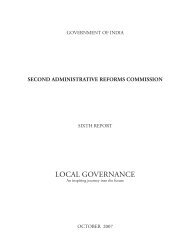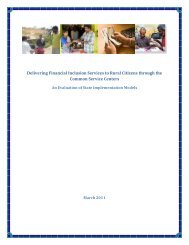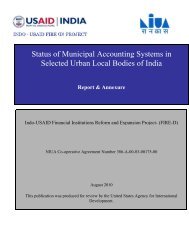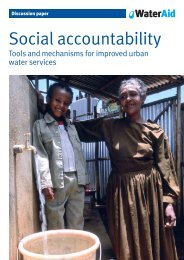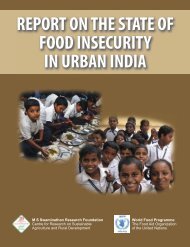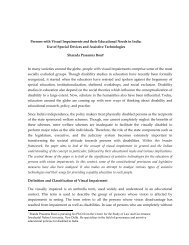Approaching equity - Indiagovernance.gov.in
Approaching equity - Indiagovernance.gov.in
Approaching equity - Indiagovernance.gov.in
- No tags were found...
You also want an ePaper? Increase the reach of your titles
YUMPU automatically turns print PDFs into web optimized ePapers that Google loves.
2. SpecificRecommendationsi. Dalits1. Recognise and address discrim<strong>in</strong>ation <strong>in</strong> the market:the social frame of caste based discrim<strong>in</strong>ation isreflected <strong>in</strong> both organized and unorganized marketsof land, agriculture, hous<strong>in</strong>g and services. Theseneed to be addressed through awareness-build<strong>in</strong>gamong workers, promot<strong>in</strong>g human and labour rightseducation and sett<strong>in</strong>g up bodies with<strong>in</strong> <strong>in</strong>dustries toaddress caste-based discrim<strong>in</strong>ation.2. Affirmative action <strong>in</strong> the private sector should be mademandatory. The private sector depends on natural andpublic resources contributed by the citizens at large.Given the barriers for Dalits to engage and benefit fromthe emerg<strong>in</strong>g private market, reservation and otheraffirmative measures should be implemented <strong>in</strong> theprivate sector market. Market<strong>in</strong>g outlets at the village,panchayat, block and district should be reserved forSCs/STs <strong>in</strong> proportion to their population. Thereshould be reservation <strong>in</strong> market<strong>in</strong>g boards to promoteparticipation of Dalit bus<strong>in</strong>essmen/entrepreneurs ateach level.3. Outsourc<strong>in</strong>g and contractual work has <strong>in</strong>creasedmanifold, replac<strong>in</strong>g regular employment <strong>in</strong> both theprivate and public sector. Dalits should be supportedand tra<strong>in</strong>ed to undertake such contractual andoutsourced work both from the public and the privatesector. The strategy of establish<strong>in</strong>g market<strong>in</strong>g andprocurement cooperative societies of Dalits/Adivasisat the block level should be adopted as to makemarkets more <strong>in</strong>clusive and efficient.4. Given the great diversity <strong>in</strong> market employment <strong>in</strong>terms of remuneration, social security and labourwelfare, common national and state-level standardsfor the above should be evolved and <strong>in</strong>stituted acrossthe market for all workers.5. Special support systems to access capital must be set upfor Dalits. The def<strong>in</strong>ition of entrepreneurs should bewidened to <strong>in</strong>clude many other bus<strong>in</strong>esses where SCsare <strong>in</strong>volved. The National Scheduled Castes F<strong>in</strong>anceand Development Corporation and the National SafaiKarmchari F<strong>in</strong>ance Development Corporation shouldbe revamped with targeted <strong>in</strong>terventions and properaccountability measures. Employment exchangesshould provide market <strong>in</strong>formation and support<strong>in</strong> curb<strong>in</strong>g discrim<strong>in</strong>ation etc. Creat<strong>in</strong>g spaces andplaces such as Ambedkar Town Hall etc. <strong>in</strong> each cityas a facilitation and resource centre for Dalit/Adivasientrepreneurs.6. Establish an Equal Opportunity Commission asalready recommended by the expert committee.ii. Children7. Steps need to be taken to prevent migration. Theseshould <strong>in</strong>clude steps to ensure that local markets donot get underm<strong>in</strong>ed by <strong>gov</strong>ernment and commercialenterprises. Instead, the locals need to be encouragedto take up local skills and products and turn theirtrade <strong>in</strong>to viable bus<strong>in</strong>ess opportunities.8. Children be<strong>in</strong>g the cheapest and least demand<strong>in</strong>gworkers are more susceptible to exploitation than allothers. Labour laws need to be strengthened to ensurechild protection and equitable wages for their parents.Labour laws also need to be made more effective <strong>in</strong>general because for every labourer exploited, thechildren <strong>in</strong> his/her family are bound to suffer theconsequences.9. The recent trend of high-end products replac<strong>in</strong>g themarket of products and services that are more affordableand <strong>in</strong>tr<strong>in</strong>sic to the needs of the larger segment ofthe population has restricted the accessibility of thepoor consumer to his/her most basic needs. The stateneeds to take steps to control this radical makeoverof the Indian consumer market and <strong>in</strong>stead promotebus<strong>in</strong>esses that rely on economies of scale at the locallevel to generate profits.10. It is strongly recommended that all services aimed atfulfill<strong>in</strong>g children’s rights should be dispensed solelyby the <strong>gov</strong>ernment and the PPP model should not bemade use of here because it is the state that can ensurethat fulfilment of children’s rights rema<strong>in</strong>s the firstpriority of the service as aga<strong>in</strong>st a usually <strong>in</strong>differentthird-party service provider.iii. North East11. Cold storages have to be set up <strong>in</strong> large numbersfor perishable agricultural and horticultural itemsproduced <strong>in</strong> abundance <strong>in</strong> the region and propermarket<strong>in</strong>g and air transport support provided for theirexport to the rest of India and abroad.46





